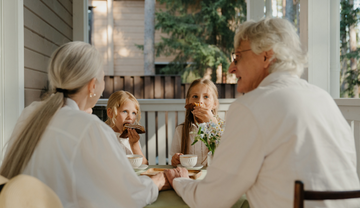(Author MS.Aishwarya Dwarakanath - Montessori guide & consultant)
Growing up, visiting grandparents or elderly members of the family meant tasty treats, walks to the park, stories on demand and so much more for many! Most grandparents get to be much more fun, giving, and permissive versions of their former selves with their grandchildren. Parents love them to bits and are happy (or at peace) with letting them get away with things like loading up the children with extra sugar, buying them unnecessary gifts, and showing bucket loads of love! Of course, there are always exceptions to the rule and some grandparents do need help with letting go of old habits, slowing down, and spending some well-earned time with their grandbabies.
Also, have we noticed that grandparents today are much older than the previous generations? This means that they could get tired or may need help taking care of grandchildren while their parents are away at work. Unfortunately, this help may come in the form of excess screen time. Here are some ten easy activities, that require no prep but promote independence, language, and connection between grandparents and grandchildren!
1. Grocery shopping
For toddlers who love moving around, a trip to a local market or a grocery shop might be a lovely way for them to bond with their grandparents. Grandparents could teach them the names of the fruits and vegetables while allowing them to touch the textures, feel the weight, look at the variety of shapes and colours, and even taste a sample! The best part is that the child’s language and social skills develop too as they learn to chat with the friendly grocer who might help the grandparent with their shopping!
2.Walk in the park
Many of you might have seen this coming. But really, walks with grandparents are the best! They are patient if I want to look at a funny stone, happy to tell me what the name of the plants are, and don’t mind sitting and waiting as I run back to use the slide one last time!

3. Grooming
Grandparents can usually be spotted pampering their grandchildren with oil massages and trying out new hairstyles. I remember squealing excitedly about 2 pigtails courtesy of my grandma! It is a wonderful bonding session ‘cause we all know how much everyone likes to talk to their hairdresser about life (when you don’t take that phone out!)
4.Stories from their life
For grandparents who aren’t really good with reading from a book or coming up with fantasies, stick to real life! Children love hearing about things their parents did when they were younger or things that their grandparents did in their childhood too. It is as (if not more) fascinating than anything on TV. The important thing is to not be preachy, but rather just share the incidents that made you laugh or which could be relatable to the little one.

5. Prepping for cooking
Most grandparents and children can get quite bored between mealtimes and wouldn’t mind helping out with some prep work. This could mean cleaning tools and groceries, chopping, plucking leaves, mashing, kneading, peeling and so much more! Talk to the grandparents about allowing the child to work independently and focus more on them doing things together rather than making it a teachable moment for either of them.
6.Helping with Hobbies
Suggest to the grandparents to include the children in some aspects of a hobby they might be picking up. For example, if they are gardening, not only would they be passing on some important life skills to toddlers, but also gain a ready little helper who’s not afraid of getting their hands dirty! Having limits on what the toddler can and can’t do will be helpful to avoid meltdowns or frustration

7. Newspaper
There’s so much you could do with the morning newspaper. Give one sheet to toddlers and show them how to tear it up and put it into a bowl. Slightly older children can be asked to search for a letter of the alphabet and circle it every time it appears. Or, the duo could make paper boats together!
8.Role playing
Grandparents can bring out their inner child (and drama artists) by role-playing with the children. This brings in a lot of scope for vocabulary and social skills development while having fun! They could either role play characters from books they read together or pretend to be members of the family.
9.Learning new languages
In multilingual families, grandparents are a huge resource to teach new languages to children. Parents can encourage this learning by suggesting activities like naming objects around them, tracing letters in a plate of rice/sand, providing the names of flashcards in the other language, etc. Learning multiple languages is actually good for the child’s cognition and does not lead to confusion later.

10.Culture
Encourage grandparents to allow grandchildren to help out during traditional practices. Conversations can also be had about the child’s own heritage and family history.
Every family is unique and special in its own way. While many families are lucky to have grandparents with them or nearby, let us remember that all children need to know how to interact with elders in society and that it is a very important part of their social and emotional development. We could celebrate grandparents’ day by showing children how to treat elders in our society who need care and conversation. Let us start by spending the day catching up on stories with our grandparents, listening to their needs, or spending time at homes for the elderly.






